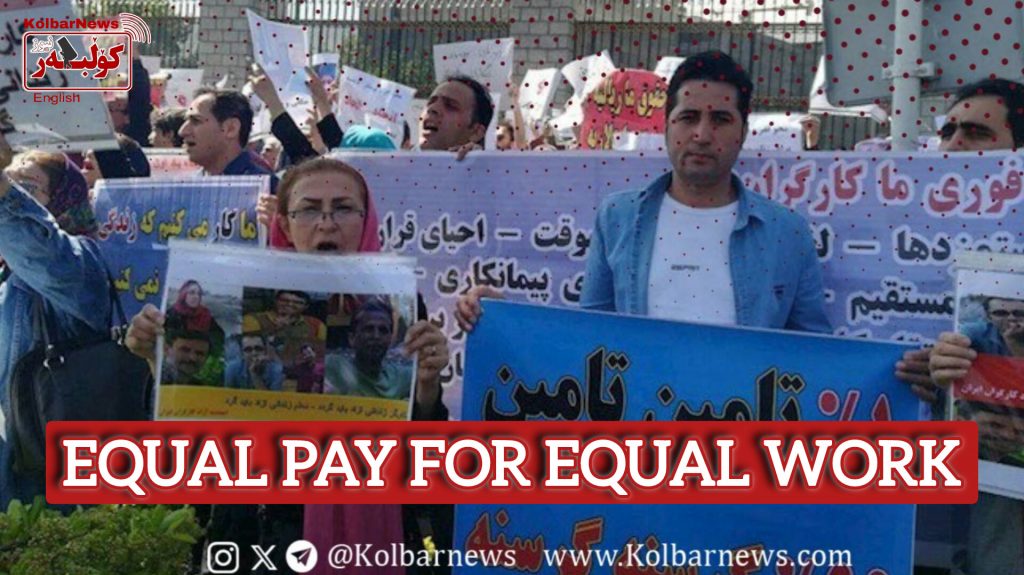
According to the United Nations calendar, September 18 is recognized as the International Equal Pay Day for Equal Work. Both men and women workers face discrimination under the capitalist system, but women experience significantly more discrimination. According to bourgeois standards, men and women should receive equal pay for work of equal value. The concept of equal pay for equal work means that men and women should be paid equally for the same or similar work. Additionally, men and women should receive equal pay for work that may differ in some aspects but is considered equal in value.
Globally, women in formal jobs earn, on average, 84% of what men earn. This disparity is even more pronounced for immigrant women, women of color, and women who are the sole providers for their families. Looking at the working and living conditions of workers worldwide shows that in countries where labor rights are fought for more widely, wage inequality tends to be less prominent.
In Iran, in addition to gender, factors such as ethnicity, nationality, and religion also affect wage levels and access to opportunities. Although Iran has a skilled labor force, due to its religious capitalist government, which serves a corrupt, military, and mafia-like capitalist class that dominates Iran’s economy, the country has some of the cheapest labor in the world. Globally, only workers in Sudan earn less than Iranian workers, with women earning even less than men. This situation has been enforced through repression and by preventing the formation of independent unions.
According to the latest statistics from this past spring, in formal jobs, more than 80% of the 26 million active workers in Iran were men, with the remainder being women. Additionally, the unemployment rate for women has been rising, with male participation in the workforce being about five times that of women. Given the unemployment situation among women, a deep gender gap in the labor market is evident.
Although women’s education has increased in society, and the number of female graduates has grown, instead of being welcomed into the workforce, young women are unfortunately met with indifference from employers. It should be noted that informal workers are not included in these statistics, and the government and employers have pushed women toward informal jobs or what is called the black market. These female workers, who often work in homes, small workshops, or underground, are deprived of any legal protections and do not receive any benefits. Their wages are far below the legal minimum, which itself is three to four times below the poverty line. According to Islamic law, men are considered the breadwinners of households, and employers view women not as full workers but as supplementary earners for men. Among women, immigrant women, typically Afghans, are in an even worse situation and are subjected to greater oppression. In addition to low wages, women face unequal access to employment, healthcare, education, political empowerment, sports, and leisure.
However, under the rule of a religious capitalist government, and due to the existence of crony capitalism and extremely greedy private sector investors, not only women but many male workers do not receive equal pay for equal work. Government, military, and private sector employers pay relatively decent wages and benefits to a small class of workers who have official contracts. But other workers, hired by parasitic contractors worse than other capitalists, are paid far less for similar work. Employers use this tactic to both raise their profits and sow division among workers. In the labor movement, equalizing wages, salaries, and benefits has a special place. In cases where less informed workers blame skilled or more experienced workers for their lower wages, activists remind them that the main cause is the employers and the government, not their fellow workers. This way, they help foster class unity. The oil company and its contractors are infamous for paying relatively good wages and benefits to a thin layer of workers, called “official” workers. Among the demands of striking contract workers and third-party employees is the equalization of wages and benefits, along with the call for 14 days of work followed by 14 days of rest across all oil projects. This demand has gained support from the more progressive official workers, who benefit from these advantages.
Neoliberal economics, by withholding wages according to bourgeois economic rules, has created extreme inequality for the majority of workers worldwide. In such conditions, imposing equal pay for equal work is considered a step forward for workers, especially women workers. However, for the ultimate elimination of all wage discrimination, wage labor itself must be abolished.

